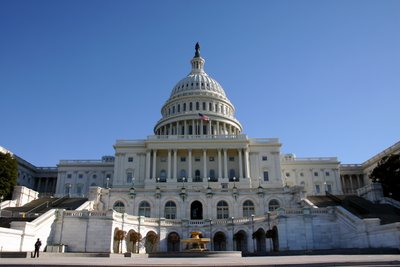[Crossposted at
Tokatakiya]
Resolution HR6164 (you can look up the text
here) passed the House of Representatives on September 26th and has now been referred to the Senate Health, Education, Labor, and Pensions (HELP) committee.
HR 6164 aims to continue the
Republican War on Science by crippling the National Institutes of Health (NIH).
The President of the American Association for the Study of Liver Diseases (AASLD) detailed many of the insidious provisions of HR6164 in an
open letter (pdf) to the HELP committee's ranking member, Senator Edward Kennedy (D-Mass).
"After careful review and modeling of future NIH budget scenarios, AASLD has concluded that the NIH Reform Act of 2006 will deal a sever and crushing blow to the future of biomedical research in this country. Damage to the research enterprise will result in the permanent loss of investigators and technical support staff from our academic centers with an inevitable negative impact on America's position as the world's leader in basic, translational and clinical research and as the creator of much-needed high paying, technology jobs in our country.
Several provisions of HR6164 will negatively impact our ability to develop the new diagnostics, treatments and, ultimately, cures:
For the first time ever, this legislation places a cap on the amount of funding Congress can appropriate to NIH by replacing the existing "such sums" language with hard limits. Had this bill been in effect from 1998 to 2003, the will of Congress to double the NIH budget would have been thwarted, and our current funding levels would never have been achieved.
The legislation creates a "Common Fund" by siphoning off money from the institutes and centers. Under provisions of the bill, 50 percent of any increase in NIH funding would go to the Common Fund; but 100 percent of any reduction would be borne by the institutes and centers - and thus by peer-reviewed research.
The budget of the Director's Office at NIH would be authorized at a level in excess of $1.0 billion (it is currently appropriated at $527 million). Again,this funding would come at the expense of the institutes and centers.
The authorization caps,when combined with the Common Fund and the Director's Office authorization level - and when controlled for biomedical research inflation - assures that NIH will not experience more than a 1 percent increase for the life of this bill, even if Congress appropriates the fully authorized amount - something it rarely does." [Emphasis mine.]
Make no mistake, crippling the NIH like this will have unimaginably damaging effects on the biomedical sciences for years, possible decades, to come.
This issue affects all Americans, every single one of us. The NIH provides the funding that fosters new treatments and cures, not to mention the many new biomedical start-ups that are built on discoveries made using NIH grant money. These start-ups create jobs. Not only is biomedical science
THE growth industry of the 21st century but biomedical jobs will likely play a large part in replacing the manufacturing jobs that are being shipped overseas.
This bill is short sighted. It will reduce the quality and quantity of science performed in this country. It will reduce the number of new treatments, cures, and drugs discovered in this country. It will damage the short and long-term growth of biomedical industry in this country at a time when job growth is (and will be) sorely needed.
The good news is that this bill has not yet been passed.
Here is a list of the Senators who sit on the HELP committee and whose votes are crucial to killing this bill. If you live in a state represented by one of the Senators on the HELP committee, I urge you to use the link above to write them and request that they vote against HR6164. If you don't live in one of these states, please
contact your Senator and request that they vote against HR6164 (and urge their colleagues to vote against it) if it makes it to a floor vote.
This isn't just legislation that will hurt scientists in their ivory towers, this will affect every man, woman, and child in the United States. (Very likely much of the rest of the world as well.) Please take this seriously and please take the time to write a note to your Senator to kill this bill.
It will be the most important thing you do today.











